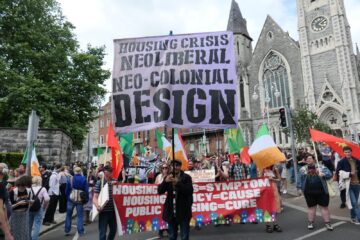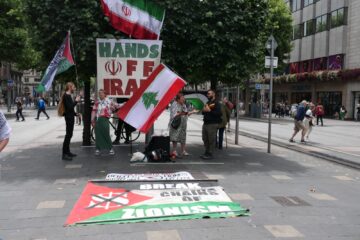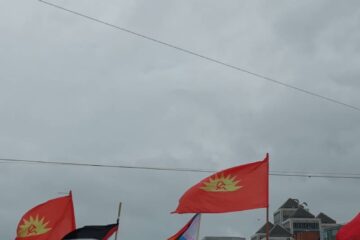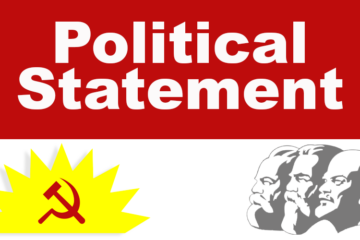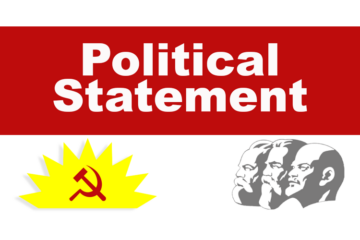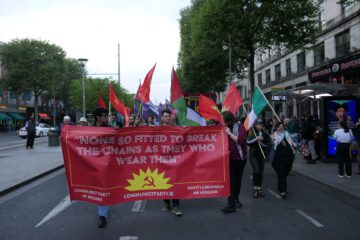5 February 2011
At its regular meeting in early February the National Executive Committee of the Communist Party of Ireland discussed the deteriorating economic crisis, north and south, while people continue to find the ways and means to resist the onslaught of the state and employers in relation to attacks on their incomes, education, health and public services.
Since our last meeting we have seen small but important steps or green shoots of resistance beginning to emerge, such as the People’s Congress sponsored by NIC-ICTU that took place on 5 February in Belfast. Trade unions in the North have been very active in building across communities and campaigns to build people’s unity against the cuts imposed by London. We welcome the “Claiming our Future” conference held in Dublin in late 2010, and the number of follow-up regional meetings under its auspices have drawn people together.
Also of significance was the conference that took place in Dublin of left, community and trade union activists, which is to be welcomed. What is notable is that some trade unions have begun to see and operate at a political level, linking their struggle with that of the communities. They no longer see the Labour Party as the sole party that workers can or should identify with. While at this time much of the concentration in the South has been focused on elections, it is important that the struggles and demands are not reduced solely to electioneering but also consider what the people and their organisations will do after 25 February.
In the North the welcome demonstration by thousands of people who took part in the Bloody Sunday Commemoration in Derry shows the power of the people to fight over a long time to expose the role of the British state and was well vindicated in the findings of the Saville Inquiry into the events on that day. Yet, while we have the positive expression of mass people power, we witness elements within republicanism that are clearly attempting to step up a method of struggle in the form of armed actions that have in the recent past wreaked havoc, death and division among our people—a method of struggle that history has shown has not and will not deliver what they claim to be struggling for. Once again we call upon them to stop their action and to step back from this blind alley that they wish to drag the people of the North down, to get involved in building the necessary people’s resistance to the growing and deepening attacks upon all that they have struggled for and achieved over many decades.
It is clear that the Irish and British governments are pursuing similar policies of making workers, their families and their communities pay the price for the deepening crisis. The crisis, and the solutions that are being imposed, expose the growing class contradictions and antagonisms at the heart of the system itself.
Not only workers are being forced to carry the burden but also small businesses, the self-employed, and family farmers. Nationally and globally, these growing attacks on the hard-won gains of the people are strategically directed to maximise the benefits to capital. Wages, terms and conditions, unemployment benefits and pensions are all coming under sustained attack. The crisis and the ruling-class offensive are to allow them to implement what was unthinkable a short while ago.
The reduction in the minimum wage in the Republic by €1 per hour is a savage assault on the lowest-paid, while there are tens of thousands of workers who are already earning less than this subsistence wage. The attack on the minimum wage is only the prelude to a growing assault on registered employment agreements and employment regulation orders (EROs). As the CPI has already pointed out in relation to the punitive EU-IMF “Programme for Ireland” imposed upon the Irish people, this will exacerbate an already unbearable debt burden. No amount of “renegotiation” or tinkering with the wording of this or that paragraph can change the underlying savage attack on the people that the outgoing Government agreed to—an agreement that all three main establishment parties and the Green Party actively support, despite their protestations of wanting to renegotiate sections of the deal.
The next meeting of the heads of EU member-states will see a further tightening of control by the centre while the uneven, neo-colonial relations between the centre and the peripheral countries becomes ever more consolidated.
The forthcoming general election in the Republic will not solve the many problems facing our people, but it will be an opportunity for the people to vent their anger at the political establishment, particularly Fianna Fáil and the Green Party.
The Labour Party’s much-talked-about breakthrough is now melting like snow off a winter’s ditch. Its opportunism and empty policies are increasingly seen through by growing numbers of working people. It has nothing to offer that would give the people leadership and a new direction or a better way forward.
While some important individual trade unions have supported and are actively supporting the building of alternative social and political actions and alternatives, this work in patchy and lacks focus, as many leading elements of the ICTU are still wedded to “social partnership,” hoping against hope that they can rebuild it. There are grave dangers in that strategy, in that they could well end up being perceived as propping up and in essence adopting a strategy of “better, fairer cuts.”
While only in the embryonic stage at this time, there are positive examples of the role that trade unions in the North, working in alliance with community and social organisations, can build affective coalitions of resistance.
The central question facing the people in the Republic is the spiralling sovereign debt crisis. The socialisation of billions in private corporate debt by the Government has made indentured labourers of the Irish people for generations to come—all done under orders from the European Union and international finance houses.
The deepening crisis and the policies that the British coalition government is pursuing have had a disproportionate impact on the people of Northern Ireland. The cuts in the subvention have exposed the dependence relationship that exists and that is a major factor in making solutions to the crisis much more difficult, if not impossible, if that dependence relationship is not severed. The transfer of fiscal powers from the British government to the Executive in crucial; but the transfer of fiscal powers must occur with no loss or reduction in the subvention from the British exchequer but must be guaranteed to be sustained over an agreed period.
The Communist Party of Ireland calls upon working people in the Republic to vote for left and progressive candidates, to support those parties or left independent progressive candidates that call for the repudiation of the illegitimate, punitive and perpetual debt forced on the people. There should be no votes for Fianna Fáil or Fine Gael.
The strategy adopted by the leading elements within the Labour Party to turn their backs on any left alternative or containing an alliance of left parties either before or after the election has raised serious questions for those contemplating voting Labour. Is Labour once again going to wait and become a prop for Fine Gael? Are they going to confirm what many have suspected for a long time, that they are just Fine Gael Light? Clearly leading elements of the Labour Party are part of the problem, not part of the solution.
The elections are not the end but rather must be seen as the starting-point in building the people’s resistance, in building a coalition of resistance on a range of issues, including the privatisation of public companies and assets in a fire sale to meet the demands of the EU and IMF. Central must be the building of the broadest coalition of all those affected by the debt to demand its repudiation. The growing illegitimate “sovereign debt” is the weakest link in the EU imperial chain. A campaign of repudiation of the debt by workers’ and people’s organisations throughout the European Union is the key to degrading and eventually breaking the capacity of monopoly capitalism to impose its will. The repudiation of the debt is a vital necessity if we are to make progress linked to the building of a national democratic coalition. A Democratic Programme must also include
(1) the repatriation of economic powers from Brussels;
(2) the social and democratic control of capital;
(3) an all-Ireland economic development body to harness the talents of our people, from Antrim to Cork;
(4) the national and social control of all mineral and natural resources;
(5) the planned development of a socially just and sustainable all-Ireland economy.




